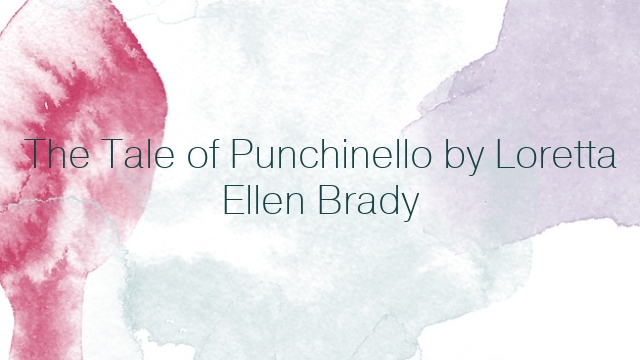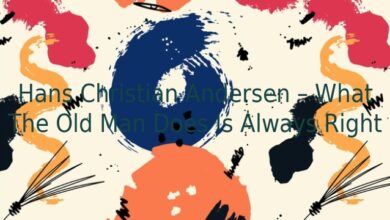
The Tale of Punchinello by Loretta Ellen Brady
The Tale of Punchinello from Brady’s collection, The Green Forest Fairy Book (1920), is about a kind-hearted clown who teaches a sick, lame boy to dance and become a great clown himself.
The Tale of Punchinello
There lived once long ago, in days of jesters and court fools and harlequins, a certain clown called Punchinello. This Punchinello, like all others of his trade, whitened his face and painted it in grotesque fashion. He wore gay satin robes of many colors all hung with silver bells that jingled when he danced, and pom-pom slippers turned up at the toes. This Punchinello was a clown of clowns, and his droll dances and his merry tricks and songs had made thousands laugh.
Punchinello traveled around the world in company with a circus. Whenever this circus reached a city, it formed a great parade before it entered. Then would the people throng the streets and highways, eager for the show. They clapped their hands when lions roaring in their cages and elephants led by their keepers passed along; but when this famous Punchinello, prancing and twirling, came in view, the crowds cheered wildly with applause.
“Oh, welcome! Welcome, Punchinello!” they would shout.
The ladies threw him flowers and children blew him kisses. Kings and queens had often hailed him thus, for Punchinello pleased all folk. Those who were sad and those who sorrowed often sent for Punchinello when the circus show was done, and he would dance and sing to cheer them. But for this service he would take no gold or present. So though he grew to fame, this Punchinello grew not rich.
“It is enough that I can make sad faces glad,” said Punchinello, and wrapping his great cloak about him, he would steal away, leaving happiness behind him.
“My store of wealth lies in the golden smiles my antics bring,” he often said, “and when my merry songs and dances please the world no more, I shall be poor indeed.” But with his light, fantastic dancing, and his songs and jests, with his twirlings and his leapings,—was it likely that the world would ever cease to smile on Punchinello? The world is always fond of fun and laughter.
“Punchinello is the greatest man in all the world,” some folk said when they had seen him dance and heard him sing.
“That is not right,” said others. “He would be emperor if that were true; but Punchinello is the greatest man in all the circus.”
“But neither is that right,” still others said. “For if he were, he would be owner of the circus. But Punchinello is the greatest clown in all the world.” And on this all folk agreed.
Now on its way about the world, the circus chanced to journey to a city where a king and queen held court. These royal folk and all their court watched the gay procession from their balconies and were delighted. The king and queen sent heralds, saying on a certain night that they would grace the show and to be sure that Master Punchinello played before the royal box. Then as the pageant wound upon its way, with banners flying and with music of the fife and drum, they passed a building where the sick were tended. It was a hospital. No eager faces gave them welcome here, and lest they should disturb the sick, the fife and drum ceased playing. Punchinello fell to walking soberly along. Suddenly he chanced to spy a tiny, wistful face pressed to the window pane. Then Punchinello bounded lightly up the ladder, and leaping into the room, began to dance and twirl about to please this little child.
“And does my dancing please you, little one?” asked Punchinello when he paused.
“Oh, yes, sir!” cried the child. His name was Beppo. “Please dance again for me. It makes my pain grow better.”
“Alas! I cannot, little one,” said Punchinello, pointing to the circus that was passing. “I must make haste to join my friends again.”
“Then would you come to-night when it is dark and dance for me?” begged little Beppo. “The pain is always worse when it is dark, you know.”
“Indeed, I’ll come, my little one,” said kindly Punchinello, and his gayly painted face grew sad. “Just leave your window open, little one, and I’ll steal in and dance for you and sing you to the land of happy dreams.”
And that night, when the circus show was done and all the lights were out, while other tired players slept, this kindly Punchinello wrapped his cloak about him and stole out underneath the stars to visit little Beppo. The little lame child was delighted with his songs and dances, so kindly Punchinello vowed that he would come each night and do the same, while the circus remained in the city. Each night the child lay waiting for him eagerly, and how he hugged and kissed this Punchinello when at last he came!
“Last night I dreamed of running through the woods,” cried little Beppo to him one night. “I saw tall trees that seemed to touch the sky and heard the birds sing in their nests. I never had a dream like this before, and your sweet songs did give it to me, Punchinello. Come, dance and sing for me.”
Then Punchinello danced his best. His slippered feet like lightning flew; the bells upon his robes rang out, and he would twirl upon his toes until his many-colored baggy robes stood out and he seemed like a brilliant human top. He jumped, he twirled, he leaped high in the air and bowed before the little cot as though it were a royal throne. When he at last grew weary, he would stop, but then the child would beg for more.
“Oh, please, dear Punchinello,” he would say, “just once again. It makes my pain grow less to see you whirl.” Then Punchinello could not refuse, and he would whirl and twirl again until he was too weary to do more. Folding little Beppo in his arms, he sang him lullabies until the child fell fast asleep. And so the nights went on.
The nurses noticed that little Beppo’s cheeks grew plump and that his eyes grew bright. He said his pain was better, and they thought it was the medicine. They knew nothing of this Punchinello. He entered each night through the window and departed the same way. The circus folk said Punchinello was not well and told him he must rest.
“Our show would be as nothing if it were not for you, Punchinello,” they declared. “To-morrow the king and queen will come to see us play, so rest you well to-night that you may dance your gayest for them.” Though Punchinello promised, late that night, when all the world lay sleeping, he stole away to dance for little Beppo.
“Oh, Punchinello!” cried the little lame child. “I’ll tell you of my dream. I dreamed I wore a spotted satin robe like yours and pom-pom slippers turned up at the toes. I dreamed I danced and twirled as lightly as you do yourself. Now is that not a pleasant dream for one who cannot even walk?”
“It is, my little one,” said Punchinello. “Come sit upon my knee and wind your arms about my neck. Now tell me, has your pain been less to-day?”
“Much less, much less, good Punchinello,” said the child. “Indeed, I think your dances and your songs have charmed it all away. I think about my lovely dreams by day, and lie and wait for you by night, and have no time for pain, it seems. Come dance for me, my Punchinello.”
“To-night I’ll sing instead, my little Beppo,” answered Punchinello. He was weary, and when he whirled his head grew dizzy. “I’ll sing you a song of ships that sail through seas of clouds; and trees as sing the world to slow sleep when winds do blow.”
But little Beppo wished to see him dance. “See, Punchinello,” said he softly, “around your neck I tie my locket. It is my only treasure. They say my mother placed it on me when she died. It has a bluebird painted on it which is the only bird I’ve ever seen. Now wilt thou dance for me, dear Punchinello?” He kissed the clown’s queer painted face, and Punchinello danced.
And never had he danced so well before. As though he heard afar the music that the fairies make at midnight, he waltzed and twirled faster and yet faster, pausing not at all. He pranced, he leaped and spun upon his toe as though he were a dancing doll wound up to dance so long. The little lame child watched him eagerly, and as he watched, as though he too heard magic strains from fairyland, he sprung up from his cot and straightway danced and whirled about in Punchinello’s footsteps.
“Look, look, dear Punchinello!” little Beppo cried. “I am no longer lame but dance as well as you yourself.”
But Punchinello, whirling like a leaf, made no reply. He sang his gayest songs and leaped so lightly in the air, there seemed to be a thousand harlequins, and little Beppo followed lightly after. Suddenly the child stopped, for Punchinello was no longer dancing.
“Oh, my good Punchinello!” he exclaimed. “Why did you run away? I’ll follow after you,” and down the ladder he swiftly sped. He saw the white tents shining in the moonlight. “Indeed, I’ll join the circus with my Punchinello,” said he to himself, “and travel around the world with him.”
But alas! Poor Punchinello had not stolen off, as little Beppo thought. For while in his wild dance that charmed the lame child’s pain away, poor Punchinello felt himself grow ill. His head grew giddy, and at last he fell upon the floor, and there the nurses found him in the morning. They placed poor Punchinello on the bed where little Beppo had lain for so many years, and wondered whence the clown had come.
And so it was the king and queen who went next day to see the show were displeased because the famous Punchinello was not there to dance and jest for them. No other clowns or harlequins would please their royal majesties, and so they left in anger. They bade the circus owner strip his tents and in that very hour depart, and when another morning came, our little Beppo found himself in a strange city with the circus folk. At first these circus folk were puzzled what to do with him, but as the child could dance and cut droll capers, they made for him a spotted satin suit and gave him pom-pom slippers turned up at the toes. They would have called him Little Punchinello, but this the child would not allow.
“Good Punchinello was my friend,” said little Beppo. “And ‘twas from him I learned to dance before I ever walked. I will not take his name, but I will seek him everywhere until I find him.”
Some circus folk thought Punchinello had run off to join a show of traveling jugglers, and others thought perhaps he had grown tired of dancing and grimacing. Then by and by they ceased to talk of him, and all forgot him, save little Beppo.
Meanwhile poor Punchinello lay in a raging fever. The nurses thought that he would die, for he was very ill. But after a long time the fever left him, and then they knew he would grow better. He asked one day for little Beppo, but they could tell him nothing of the child.
“We came to waken him one morning, but the child was gone and you were lying ill,” said they. “We could not see how this could be, for little Beppo was too lame to walk; but though we searched the city, he could not be found.”
Another day poor Punchinello asked about the circus, and again the nurses shook their heads.
“The circus folk have gone long since,” said they. “The king was angry with them and bade them go in haste, ‘tis said. We cannot say which way they went.”
When Punchinello was all well at last; he rose and donned his many-colored robes that jingled when he walked. He had grown thin and pale, and they became him poorly, but he had not money to buy others. He wrapped his great cloak all about him and started out to earn his bread. Poor Punchinello was too weak to dance; he could not plow or dig; he had not been so trained. And so at last this famous Punchinello stood upon the highways and sang for pennies that good-natured people threw to him.
“I am the famous Punchinello,” he would sometimes say. “Have you not heard of famous Punchinello of the circus?”
But those who heard him laughed in scorn. “If you be famous Punchinello of the circus,” they would say, “why sing you then for coppers like a beggar, and where is the circus? You are not Punchinello, but a fraud.”
Thus poor and friendless, Punchinello started out to seek the circus. His wanderings led him into many lands, and often he met folk who told him that the circus had passed there. But Punchinello, journeying afoot, could never travel fast enough to overtake the circus. His pom-pom slippers soon were torn by stones along the highway, and he went barefoot. His satin robe of many colors faded and grew worn. Punchinello patched here with yarn and there with bits of leather cloth or sacking, until the colors had all fled, and it was naught but rags sewn all together. Poor Punchinello danced no more, for ragged robes and dancing do not fit; but even so, his voice was sweet and clear as ever.
“So I am not yet poor, despite my rags,” he would say bravely to himself. “For yesterday I caught a golden smile from one who flung a copper; and who knows? Perhaps to-day I may again be favored.”
Then one day in his wanderings Punchinello awakened to the music of the fife and drum. He saw gay banners flying and hurried to the highway with the crowds. It was the circus he had sought so long, and as he saw his old friends marching by, poor Punchinello’s eyes filled with tears of joy. The lion tamers with their roaring beasts strode by, the elephants in scarlet blankets decked, the jugglers next, and then a little dancing clown who stepped and pranced in drollest fashion.
“Oh, welcome, Beppo! Welcome!” cried the crowds, and Punchinello saw it was the lame child he had known.
He darted from the crowd and cried, “Oh, little Beppo, dost remember me? I am good Punchinello.”
But here the circus folk protested. “Be off! Be off! You bunch of rags!” cried they. “Our Punchinello was no beggar, and you are not he.”
“I swear I am!” cried Punchinello. “Do you not know me, little Beppo?”
“When I was ill and could not walk,” the child replied, “a clown called Punchinello cured me of my lameness by his merry songs and ways; but his face I know not. He came always in the night. When he danced, he danced so swiftly that a million harlequins there seemed to be about me: and when he held me in his arms, I hid my head against his shoulder, because I loved him dearly.”
“Do you remember this, then, little one?” asked poor Punchinello, and showed the bluebird locket, “the only treasure you did own, and which you gave to me?”
“I do, and you are my good Punchinello!” little Beppo cried, and flung his arms about him. He kissed the shabby creature and wrapped him in his own fine scarlet cloak to hide the rags. “How I have sought the world for you, dear Punchinello, to tell you of my gratitude; but I could never find you.”
The circus folk went running and crowded round the pair. “Oh, welcome! Welcome, Punchinello!” they exclaimed and shook his hand. “A thousand welcomes. We have missed you sadly and now you will be our clown again.”
“But little Beppo is your clown. What of him?” asked Punchinello.
“Oh, we shall both be clowns!” declared the child, “like father and like son. Together we shall dance those dances that you taught me and sing those songs with which you charmed the world.”
And so this Punchinello found himself once more in satin robes of many colors, all jingling merrily with bells, and pom-pom slippers turned up at the toes. His face he whitened and then painted it in grotesque fashion, and with his little Beppo he danced that night and made his old-time capers and grimaces.
“Well done! Well done! Good Punchinello!” cried the people. “We have missed you sorely, but enjoy you all the more for missing you.” They laughed and cheered him wildly until the show was done.
“And now,” said Punchinello, as he laid him down to rest that night, “I am the richest man in all the world. A thousand golden smiles were mine to-night, and better still I have the love and gratitude of little Beppo whom I dearly love. What more than that could Punchinello ask? And so good night!”





